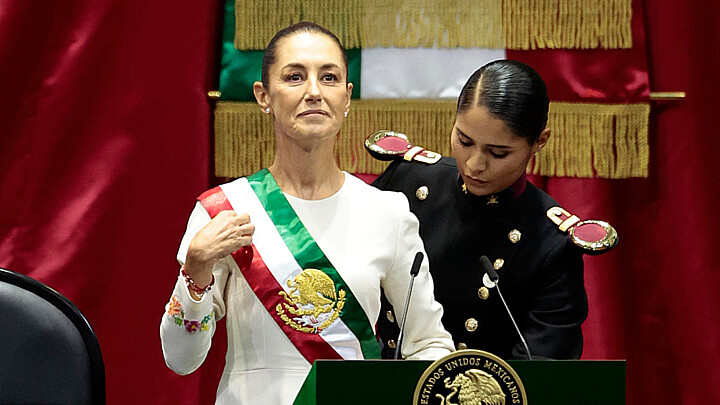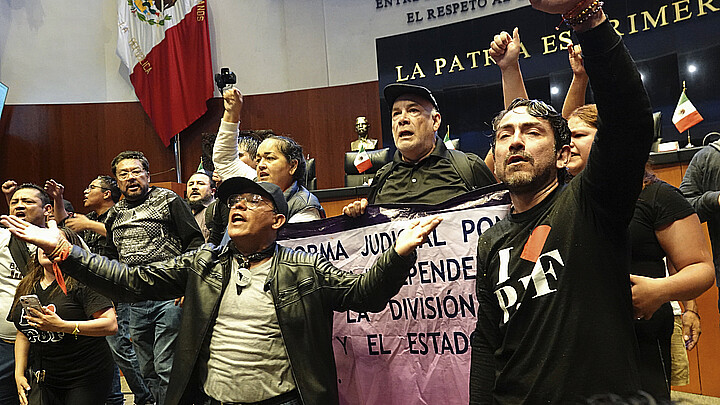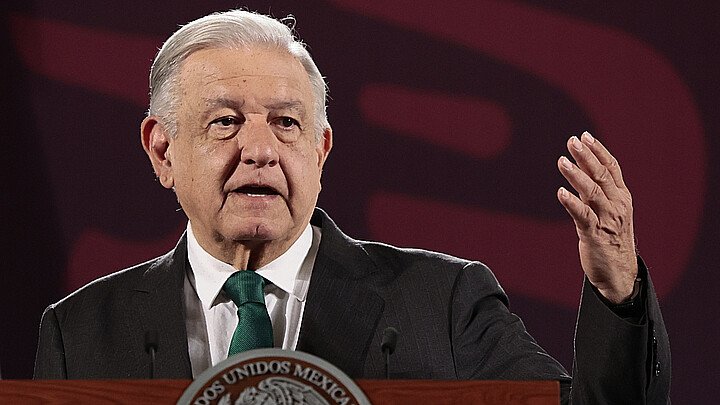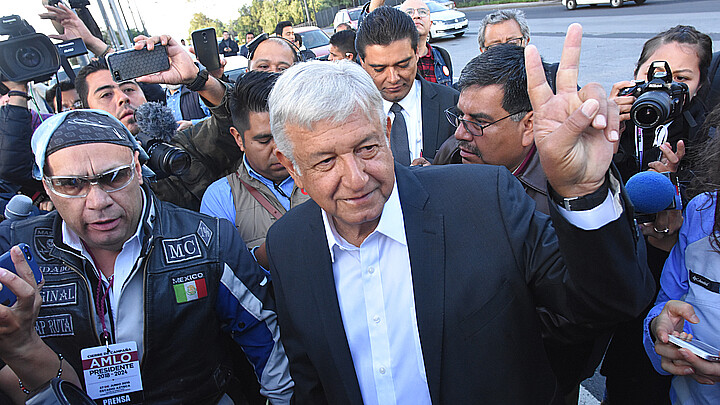Politics
Claudia Sheinbaum elected first female, first Jewish president of Mexico
Mexico has elected its first female and first Jewish president, according to preliminary results showing the 61-year old former Mexico City mayor winning nearly 60% of Sunday’s presidential election.

June 3, 2024 9:09am
Updated: June 5, 2024 12:51pm
Mexico has elected Claudia Sheinbaum, its first female and first Jewish president, according to preliminary results showing the 61-year old former Mexico City mayor winning nearly 60% of Sunday’s presidential election.
Her victory has been widely hailed as a Mexican referendum to continue the leftist policies of her longtime mentor, President Andrês Manuel López Obrador, who has ruled the country since 2018 for the Morena Party, also known as the Movement of National Regeneration.
The Mexican president serves a six-year term but is not permitted to run for reelection.
Sunday’s estimates reported that Sheinbaum won with 58.3% to 60.7% of the vote, based on an expedited accounting based on a sample of voting stations published by Mexico’s election agency.
The new Mexican president-elect’s closest competitor, Xóchitl Gálvez, a coalition candidate of three opposition parties, trailed at about 30 percentage points behind with only 26.6% and 28.6% of the vote. Another rival, Jorge Álvarez Máynez from the center-left Citizen Movement was able to tally 9.9% to 10.8% of the vote. Sheinbaum thanked her rivals who have both conceded the election to her.
Sheinbaum, who previously served as Mexico’s Secretary of the Environment under López Obrador from 2000 to 2006 during his tenure as Head of Government, will formally take office when her former mentor departs on Oct. 1.
A scientist by trade, Sheinbaum received her Ph.D. from the National Autonomous University of Mexico (UNAM) and has written more than 100 articles and two books on the environment and sustainable development.
She has promised to continue the pro-welfare policies and “advances” made by López Obrador, which escalated Morena as the nation’s ruling party since its founding in 2011. In her victory speech to her fellow 130 million Mexicans, the incoming president said, “For the first time in the 200 years of the [Mexican] Republic, I will become the first woman president of Mexico. I’ve said it from the start, this is not just about me getting [elected], it’s about all of us getting here. I won’t fail you.”
Since López Obrador took office in 2018, he has maintained a strong 60% popularity rate by channeling national spending on welfare programs while raising taxes and cutting spending. Such “austerity” measures were implemented by U.S. President Bill Clinton when he signed the Omnibus Budget Reconciliation Act of 1993 that aimed at cutting the deficit by $500 billion over five years by reducing $255 of billion and raising taxes on the wealthiest 1.2% of Americans.
Currently, Morena has so much support in Mexico, it may have the two-thirds majority needed to successfully enact constitutionally changes without opposition, allowing Sheinbaum to fulfill critical objectives of her predecessor who hoped to reform the nation’s election agency, energy laws and even its judicial system.
Her opponents have raised concerns, specifically about the preservation of judicial independence, saying the Morena party is trying to enact constitutional reforms that would weaken the court system and instead consolidate executive power.
“This is the worst scenario that could have happened,” said Carlos Elizondo, a professor of government at the Tecnológico de Monterrey university, according to a Monday report published by The Wall Street Journal.
Sheinbaum addressed those concerns however, telling an adoring crowd gathered in the nation’s capital, “We are democrats and out of conviction would never be an authoritarian or repressive government.”
She also pledged to tackle another problem Mexico has faced—its economy but continuing to preserve the independence of the nation’s central bank, and also encourage private investment.
As of the time of this report, Mexico’s peso was down 1.05% to 17.48 per dollar in after-hours trading.
In terms of foreign policy, the new president-elect pledged to maintain respectful relations with its northern neighbor, the United States, and also promised not to forget their former citizens who have crossed the border.
“We’ll always defend Mexicans who are on the other side of the border,” she said, also ensuring there will be a “relationship of friendship, mutual respect and equality” with the U.S.
From Washington’s perspective, the United States will be hoping to secure Sheinbaum’s commitment to help prevent migrants from illegally crossing the southwest border and clampdown on the blossoming fentanyl crisis.
ADN recently reported that according to UNICEF, more than 30,000 children have crossed the Darien Gap jungle land bridge that adjoins South and Central America between January and April, and that migrants have been undaunted by transnational efforts to effectuate deportations to the southern Mexican border near Guatemala.
Both Americans and Mexicans alike will also be closely watching her efforts to tackle violent crime.
As mayor of Mexico City, Sheinbaum was able to cut the city’s homicide rate in half. Her election comes at a time when cartel violence, kidnappings of journalists, forced disappearances, assassinations and murders and corruption have been amplified by more than 200 criminal enterprises and gangs.
Crime has played a significant role in the 2024 elections. Violence plagued the elections, which also spanned across Mexico’s Congress and governors in nine of the federal republic’s states.
According to the government and a report published by the BBC, at least 20 and as many as 37 local candidates were assassinated across Mexico during the election season.
Sheinbaum’s proposed answer to the problem has been focused on increasing welfare programs so that young people purportedly do not experience poverty in hopes they do not feel so desperate as to join cartels and other criminal enterprises.
Sheinbaum’s main opponent, Gálvez, and her opposition coalition have been critical of that approach and Morena’s past leadership on criminal justice issues. In her conciliatory call to Sheinbaum, the opposition candidate raised the issue front and center.
“I told her I saw a Mexico with a lot of pain and violence. I wished that she could solve the severe problems our people have,” Gálvez said about their conversation.
Economically, Sheinbaum will have to address the U.S.-Mexico-Canada Agreement (USMCA), which is due for review in 2026.
Washington and Mexico City have had different policy perspectives on both agriculture and energy after López Obrador changed foreign investment laws and prohibited genetically modified corn, two legal shifts that impacted U.S. companies.
According to The Wall Street Journal, economists are predicting that manufacturing will become a critical issue in intergovernmental relations between the two North American powers, especially since Mexico is the apparent base for new nearshoring goals to get U.S. companies out of China.
To that end, Sheinbaum has insisted that she considers the USMCA an important focus for her country’s continued economic development.
Depending on who wins the 2024 presidential election in the United States, Sheinbaum’s leftist policies may clash with a possible future Trump presidency.
Sheinbaum’s election was seen as a victory for women’s rights since females were prohibited from voting until 1953. She is the first female and first Jewish president for Mexico, which is one of the largest Catholic countries in the world.
The president-elect’s maternal grandparents immigrated to her home country from Bulgaria while fleeing the Holocaust and the Third Reich. Her paternal grandparents came from Lithuania. Both of her parents were scientists, which inspired her to study physics before she obtained her doctorate degree in energy engineering. As part of her scientific education, she studied at a California research lab, closely researching Mexican energy patterns.
Exit polls showed Morena on track to win at least six gubernatorial races, including the Mexico City mayor’s office.
An estimated 100 million Mexicans were eligible to vote in Sunday’s election. Mexican voters elected thousands of state and local officials, a new Congress, and nine new governors.










